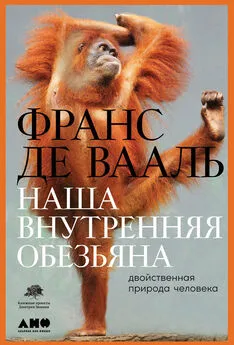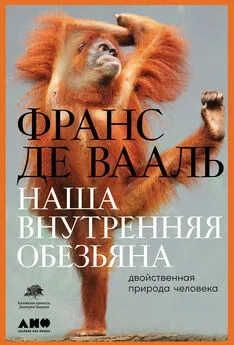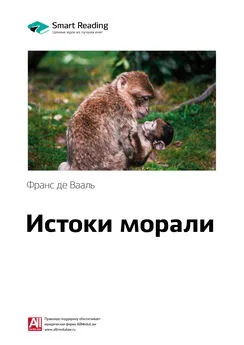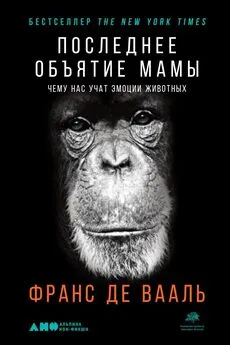Франс де Вааль - Истоки морали: В поисках человеческого у приматов
- Название:Истоки морали: В поисках человеческого у приматов
- Автор:
- Жанр:
- Издательство:Альпина нон-фикшн
- Год:2014
- Город:Москва
- ISBN:978-5-91671-275-9
- Рейтинг:
- Избранное:Добавить в избранное
-
Отзывы:
-
Ваша оценка:
Франс де Вааль - Истоки морали: В поисках человеческого у приматов краткое содержание
Помимо увлекательного рассказа об этических формах поведения в мире приматов автор поднимает глубокие философские вопросы, связанные с наукой и религией. Как и когда возникла мораль? Какое влияние оказала религия на формирование этики? Что происходит с обществом, где роль религии снижается, и прав ли герой Достоевского Иван Карамазов, говоря: «Если Бога нет, я имею право грабить ближнего своего»?
Истоки морали: В поисках человеческого у приматов - читать онлайн бесплатно ознакомительный отрывок
Интервал:
Закладка:
Hare, B., et al. 2007. Tolerance allows bonobos to outperform chimpanzees on a cooperative task. Current Biology 17: 1–5.
Harman, O. 2009. The Price of Altruism. New York: Norton.
Harris, S. 2006. Letter to a Christian Nation. New York: Knopf.
—. 2010. Hie Moral Landscape: How Science Can Determine Human Values. New York: Free Press.
Hein, G., G. Silani, K. Preuschoff, C. D. Batson, and T. Singer. 2010. Neural responses to ingroup and outgroup members’ suffering predict individual differences in costly helping. Neuron 68: 149–60.
Henrich, J., R. Boyd, S. Bowles, C. Camerer, H. Gintis, R. McElreath, and E. Fehr. 2001. In search of Homo economicus: Experiments in 15 small-scale societies. American Economic Review 91: 73–79.
Herculano-Houzel, S. 2009. The human brain in numbers: A linearly scaled-up primate brain. Frontiers in Human Neuroscience 3: 1–11.
Hitchens, C. 2007. Cod Is Not Great: How Religion Poisons Everything. New York: Hachette.
Hobaiter, C, and R. W. Byrne. 2010. Able-bodied wild chimpanzees imitate a motor procedure used by a disabled individual to overcome handicap. PLoS ONE 5: e11959.
Hobbes, T. 2004 [orig. 1651]. De Cive. Whiteftsh, MT: Kessinger.
Hohmann, G., and B. Fruth. 2011. Is blood thicker than water? In Among African Apes, ed. М. M. Robbins and C. Boesch, pp. 61–76. Berkeley: University of California Press.
Horner, V., and A. Whiten. 2005. Causal knowledge and imitation/emulation switching in chimpanzees (Pan troglodytes) and children (Homo sapiens). Animal Cognition 8: 164–81.
Horner, V, D. J. Carter, M. Suchak, and F. B. M. de Waal. 2011a. Spontaneous prosocial choice by chimpanzees. Proceedings of the Academy of Sciences USA 108: 13847–51.
—. 2011b. Reply to Skoyles: Misplaced assumptions of perfect human prosociality. Proceedings of the Academy of Sciences USA 108: E836.
Horner, V., D. Proctor, K. E. Bonnie, A. Whiten, and F. В. M. de Waal. 2010. Prestige affects cultural learning in chimpanzees. PLoS ONE 5: e10625.
Hrdy, S. B. 2009. Mothers and Others: The Evolutionary Origins of Mutual Understanding. Cambridge, MA: Belknap Press of Harvard University Press.
Hume, D. 2008 [orig. 1739]. A Treatise of Human Nature. Sioux Falls, SD: Nu Vision.
Huxley, L., ed. 1901. Life and Letters of Thomas Henry Huxley. Vol. 1. New York: Appleton.
—. 1916. Life and Letters of Thomas Henry Huxley. Vol. 2. New York: Appleton.
Huxley, Т. H. 1989 [orig. 1894]. Evolution and Ethics. Princeton, NJ: Princeton University Press.
Jammer, M. 1999. Einstein and Religion. Princeton, NJ: Princeton University Press.
Jensen, K., B. Hare, J. Call, and M. Tomasello. 2006. Whats in it for me? Self-regard precludes altruism and spite in chimpanzees. Proceedings of the Royal Society В 273: 1013–21.
Johnson, M. 1993. Moral Imagination: Implications of Cognitive Science for Ethics. Chicago: University of Chicago Press.
Joyce, R. 2005. The Evolution of Morality. Cambridge, MA: MIT Press.
Kano, T. 1992. The Last Ape: Pygmy Chimpanzee Behavior and Ecology. Stanford, CA: Stanford University’ Press.
King, B. J. 2007. Evolving God: A Provocative View of the Origin of Religion. New York: Doubleday.
Kitcher, P. 2006. Ethics and evolution: How to get here from there. In Primates and Philosophers: How Morality Evolved, ed. S. Macedo and J. Ober, pp. 120–139. Princeton, NJ: Princeton University Press.
—. 2009. Beyond Disbelief. In 50 Voices of Disbelief. Why We Are Atheists, ed. R. Blackford and U. Schuklenk, pp. 87–96. Hoboken, NJ: Wiley-Blackwell.
—. 2011. The Ethical Project. Cambridge, MA: Harvard University Press.
Konner, М. 2002. Some obstacles to altruism. In Altruistic Love: Science, Philosophy, and Religion in Dialogue, ed. S. G. Post et al., pp. 192–211. Oxford: Oxford University Press.
Kummer, H. 1995. Tfte Quest of the Sacred Baboon. Princeton, NJ: Princeton University Press.
Lamarck. J. B. 1914 [orig. 1809]. Zoological Philosophy. Translated by Hugh Elliot.
London: Macmillan. Langergraber, K. E., J. C. Mitani, and L. Vigilant. 2007. The limited impact of kinship on cooperation in wild chimpanzees. Proceedings of the Academy of Sciences USA 104: 7786–90.
Langford, D. J., et al. 2006. Social modulation of pain as evidence for empathy in mice. Science 312: 1967–70.
Lee, R. B. 1969. Eating Christmas in the Kalahari. Natural History 78(12): 14–22,60–63.
Levin, J. S. 1994. Religion and health: Is there an association, is it valid, and is it causal? Social Science and Medicine 38: 1475–82.
Linfert, C. 2003 [orig. 1972]. Hieronymus Bosch. New York: H. N. Abrams.
Lorenz, K. 1960. So kam der Mensch auf den Hund. Vienna: Borotha-Schoeler.
Macedo, S., and J. Ober, eds. 2006. Primates and Philosophers: How Morality Evolved. Princeton, NJ: Princeton University Press.
Malenky, R. K., and R. W. Wrangham. 1994. A quantitative comparison of terrestrial herbaceous food consumption by Panpaniscus in the Lomako Forest, Zaire, and Pan troglodytes in the Kibale Forest, Uganda. American Journal of Primatology 32: 1–12.
Malhotra, D. 2010. (When) are religious people nicer? Religious salience and the «Sunday Effect» on pro-social behavior. Judgment and Decision Making 5: 138–43.
Marcus Aurelius. 2002 [orig. 170–18 °CE]. The Emperors Handbook: A New Translation of Die Meditations. New York: Scribner.
Matsuzawa, T. 2011. What is uniquely human? A view from comparative cognitive development in humans and chimpanzees. In Hie Primate Mind, ed. R В. M. de Waal and P. F. Ferrari, pp. 288–305. Cambridge, MA: Harvard University Press.
Mayr, Е. 1997. This Is Biology: Tlie Science of the Living World. Cambridge, MA: Harvard University Press.
McCauley, R. N. 2011. Wiry Religion Is Natural and Science Is Not. New York: Oxford University Press.
Mendes, N., D. Hanus, and J. Call. 2007. Raising the level: Orangutans use water as a tool. Biology Letters 3: 453–55.
Mercader, J., et al. 2007. 4,300-Year-old chimpanzee sites and the origins of percussive stone technology. Proceedings of the National Academy of Sciences USA 104: 3043–48.
Mercier, H., and D. Sperber. 2011. Why do humans reason? Arguments for an argumentative theory. Behavioral and Brain Sciences 34: 57–111.
Midgley, M. 2010. The Solitary Self Darwin and the Selfish Gene. Durham, UK: Acumen.
Miller, H. 1957. Big Sur and the Oranges of Hieronymus Bosch. New York: New Directions.
Montaigne, M. 1902 [orig. 1877]. Essays of Montaigne. Translated by Charles Cotton. Vols. 1–4. London: Reeves & Turner.
Mukamel, R., A. D. Ekstrom, J. Kaplan, M. Iacoboni, and I. Fried. 2010. Single neuron responses in humans during execution and observation of actions. Current Biology 20: 750–56.
Muscarella, F., and M. R. Cunningham. 1996. The evolutionary significance and social perception of male pattern baldness and facial hair. Ethology and Sociobiology 17: 99–117.
Nevins, A., D. Pesetsky, and C. Rodrigues. 2009. Piraha exceptionality: A reassessment. Language 85: 355–404.
Nietzsche, F. 2006 [orig. 1887]. On the Genealogy of Morality and Other Writings. Student Edition. Cambridge: Cambridge University Press.
—. 2007 [orig. 1889]. Twilight of the Idols with the Antichrist and Ecce Homo. Hertfordshire, UK: Wordsworth.
Norenzayan, A., and I. G. Hansen. 2006. Belief in supernatural agents in the face of death. Personality and Social Psychology Bulletin 32: 174–87.
Norenzayan, A., and A. F. Shariff. 2008. The origin and evolution of religious prosociality. Science 322: 58–62.
Norscia, I., and E. Palagi. 20it. Yawn contagion and empathy in Homo sapiens. PLoS ONE 6: e28472.
Nowak, М., and R. Highfield. 2011. SuperCooperators: Altruism, Evolution, and Why We Need Each Other to Succeed. New York: Free Press.
Numbers, R., ed. 2009. Galileo Goes to Jail and Other Myths about Science and Religion. Cambridge, MA: Harvard University Press.
Nussbaum, М. C. 2001. Upheavals of Thought: The Intelligence of Emotions. Cambridge, UK: Cambridge University Press.
Osvath, M. 2009. Spontaneous planning for future stone throwing by a male chimpanzee. Current Biology 9: R190–R191.
Osvath, М., and H. Osvath. 2008. Chimpanzee (Pan troglodytes) and oranguian (Pongo abelii) forethought: Self-control and preexperience in the face of future tool use. Animal Cognition 11: 661–74.
Oxnard, C, P. J. Obendorf, and B. J. Kefford. 2010. Post-Cranial Skeletons of Hypothyroid Cretins Show a Similar Anatomical Mosaic as Homo floresiensis PLoS ONE 5: e13018.
Panofsky, E. 1966. Early Netherlandish Painting: Its Origins and Character. Cambridge. MA: Harvard University Press.
Parker, I. 2007. Swingers. The New Yorker, July 30.
Parr. L. A., and F. В. M. de Waal. 1999. Visual kin recognition in chimpanzees. Nature 399: 647–48.
Paukner, A., et al. 2009. Capuchin monkeys display affiliation toward humans who imitate them. Science 325: 880–83.
Pearson, K. 1914. The Life, Letters and Labours of Francis Gallon. London: Cambridge University Press.
Perelman, P., et al. 2011. A molecular phylogeny of living primates. PLoS Genetics 7: e1001342.
Perry, S. 2009. Conformism in the food processing techniques of whitefaced capuchin monkeys (Cebus capucinus). Animal Cogrtition 12: 705–16.
PLoS Medicine Editors. 2011. Medical complicity in torture at Guantanamo Bay: Evidence is the first step toward justice. PLoS Medecine 8: e1001028.
Plotnik, J. М., F. В. M. de Waal, and D. Reiss. 2006. Self-recognition in an Asian elephant. Proceedings of the Academy of Sciences USA 103: 17053–57.
Plotnik, J. М., R. C. Lair, W. Suphachoksakun, and F. В. M. de Waal. 2011. Elephants know when they need a helping trunk in a cooperative task. Proceedings of the Academy of Sciences USA 108: 5116–21.
Prinz, J. 2006. The emotional basis of moral judgments. Philosophical Explorations 9: 29–43.
Prüfer, K., et al. 2012. The bonobo genome compare with the chimpanzee and human genomes. Nature. 486: 527–31.
Pruetz, J. D. 2011. Targeted helping by a wild adolescent male chimpanzee (Pan troglodytes verus): Evidence for empathy? Journal of Ethology 29: 365–68.
Pruetz, J. D., and S. Lindshield. 2011. Plant-food and tool transfer among savanna chimpanzees at Fongoli, Senegal. Primates 53: 133–45.
Range, F., L. Horn, Z. Viranyi, and L. Huber. 2008. The absence of reward induces inequity aversion in dogs. Proceedings of the National Academy of Sciences USA 106: 340–45.
Renouvier, C. 1859. Essais de critique generate. Deuxieme essai. Traitede psychologic rationnelle dapres lesprincipes du criticisme. Paris: Ladrange.
Revel, J. -F., and M. Ricard. 1997. Le moine et lephilosophe. Paris: Nil Editions.
Ribberink, E., and D. Houtman. 2010. Te ongelovig om atheïst te zijn: Over de-privatisering van ongeloof. Religie & Samenleving 5: 209–20.
Ridley, M. 2001. Re-reading Darwin. Prospect 66: 74–76.
Rilling, J. K.,J. Scholz, Т. M. Preuss, M. F. Glasser, В. K. Errangi, and Т. E. Behrens. 2011. Differences between chimpanzees and bonobos in neural systems supporting social cognition. Social Cognitive and Affective Neuroscience 7: 369–79.
Roes, F. 1997. An Interview of Richard Dawkins. Human Ethology Bulletin 12(1): 13.
Romero, М. Т., M. A. Castellanos, and F. В. M. de Waal. 2010. Consolation as possible expression of sympathetic concern among chimpanzees. Proceedings of the National Academy of Sciences USA 107: 12110–15.
Ryan, C, and C. Jetha. 2010. Sex at Dawn: The Prehistoric Origins of Modern Sexuality. New York: Harper Collins.
Sandin, J. 2007. Bonobos: Encounters in Empathy. Milwaukee, WI: Zoological Society of Milwaukee.
Читать дальшеИнтервал:
Закладка:
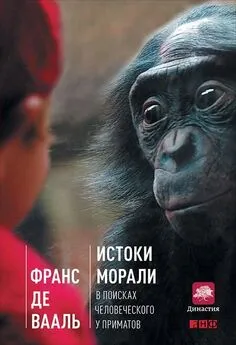
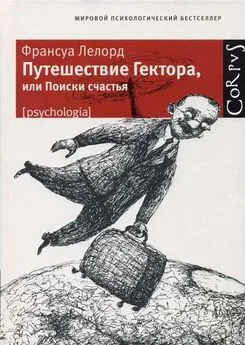


![Франс Вааль - Последнее объятие Мамы [litres]](/books/1075030/frans-vaal-poslednee-obyatie-mamy-litres.webp)
